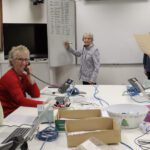Curtin University physiotherapy students have developed a new information campaign aimed at improving cardiovascular health among Aboriginal people in Western Australia’s Mid West.
Health professionals, Aboriginal elders and young people worked with three final year physiotherapy students from Curtin’s Faculty of Health Sciences to develop culturally appropriate information about cardiovascular disease.
The campaign was developed to address declining participation rates of the Aboriginal population in Geraldton Regional Hospital’s cardiac rehabilitation program.
Input from Indigenous people in the Geraldton and Mid West region helped shape information brochures, radio features and community service announcements using culturally relevant designs, colours, language and stories to reach the local community and communicate important health information.
The campaign addressed several aspects of heart health such as rehabilitation following a heart attack, overcoming fear of exercise and the benefits of regular exercise and physical activity.
Curtin University physiotherapy student, Fiona Cooke, said it was the first health education study involving the local Indigenous community and had the potential to get results.
“Our research found there were very few resources of this nature available to Aboriginal people and it is hoped the resources will develop a greater understanding in the Aboriginal community about cardiovascular disease and the importance of maintaining heart health for long term benefits,” Fiona said.
Professor Jill Downie, Pro Vice-Chancellor Health Sciences, said the improved skills and understanding will ultimately help health professionals to provide better services for Aboriginal people.
“It is vital for students and health professionals to expand their knowledge of Aboriginal culture and beliefs to ensure the effectiveness of health programs and relevance to Indigenous people,” Professor Downie said.
“Developing health programs in the cultural context of Aboriginal people, and their beliefs and values instead of enforcing a ‘we know best’ approach are more likely to bring about lifestyle changes needed to improve cardiovascular health.”
Studies* have shown Indigenous Australians suffer cardiovascular disease at a younger age and at almost double the rate of non-Indigenous Australians and are more likely to die as a result of the disease.
The program was developed in close consultation with the Geraldton Regional Aboriginal Medical Service (GRAMS), Combined University Centre for Rural Health (CUCRH), Radio MAMA (community radio), and Geraldton Regional Hospital.
Notes to Editors:
* Studies include 2004/2005 National Health Survey and Australian Bureau of Statistics 2006
Contacts:
Denise Cahill, Public Relations, Curtin University
Tel: 08 9266 1931, Mobile: 0401 103 683, Email: d.cahill@curtin.edu.au
Web: http://curtin.edu.au


